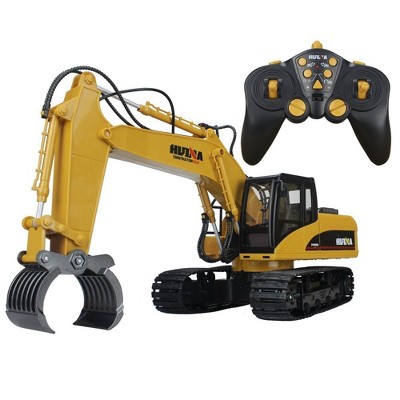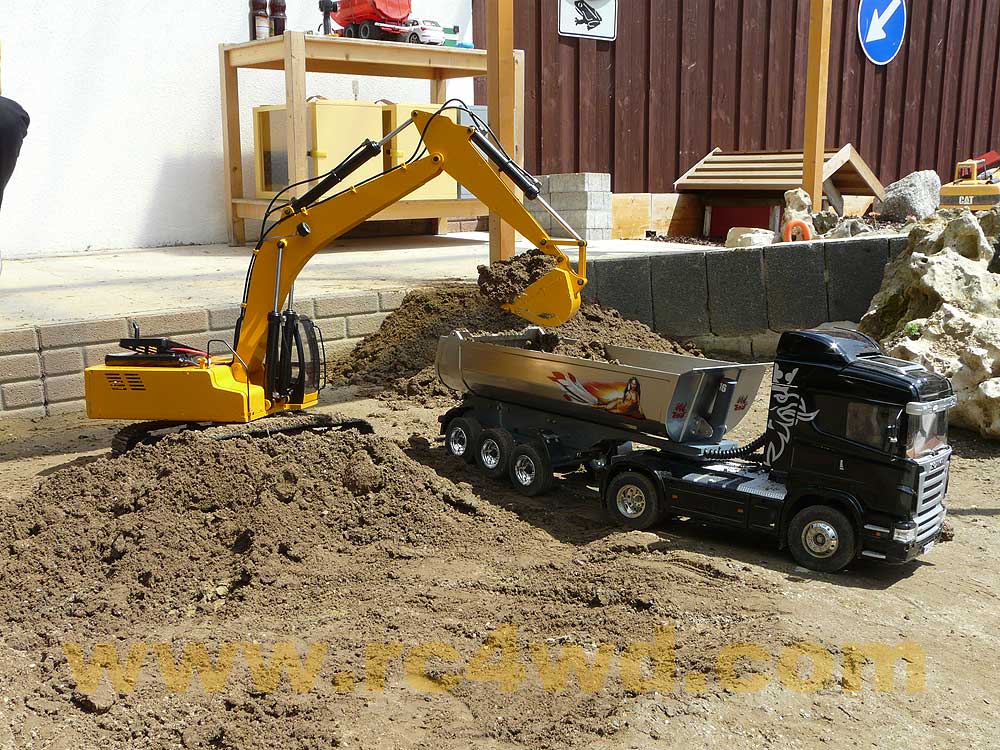Exploring the Key Features of the rc excavator for Modern Construction
Discover the Importance of Excavator in Modern Construction Projects
Excavators are important devices in modern building and construction projects. Their adaptability permits them to execute a wide variety of tasks, from digging and grading to demolition and site prep work. Advanced attributes, such as hydraulic accessories and GPS, enhance their capabilities and effectiveness on task websites. As the market evolves, the relevance of excavators expands much more. Recognizing their duty can reveal understandings into the future of building practices. What lies in advance for these devices?
The Adaptability of Excavators in Different Projects
Although excavators are typically connected with massive building and construction tasks, their adaptability enables them to be utilized in a vast array of applications, from household landscaping to utility upkeep. In metropolitan settings, excavators can navigate tight rooms to dig structures for homes or install drainage systems. Their ability to carry out delicate tasks makes them excellent for landscape design tasks, where they can excavate for fish ponds or plant trees. In enhancement, excavators play a vital role in utility upkeep, successfully digging trenches for pipelines or cable televisions without disrupting surrounding areas. In farming applications, they assist in land clearing up and dirt prep work. In addition, their flexibility enables them to be equipped with numerous accessories, improving their functionality across different jobs. This diverse nature of excavators not only improves different building procedures however additionally demonstrates their integral function in contemporary facilities advancement and maintenance.
Key Features and Sorts Of Excavators
The discussion on vital attributes and types of excavators highlights the essential features that make these devices vital in construction. Numerous excavator kinds, each developed for specific jobs, demonstrate their adaptability and performance throughout various applications. rc excavator. Comprehending these classifications and functions is important for enhancing their use in contemporary building jobs
Excavator Keys In Summary
Excavators play a crucial duty in modern building and construction, offering adaptability and performance across various jobs. These heavy machinery systems come in several kinds, each tailored for specific applications. One of the most common types include spider excavators, known for their stability on unequal terrain, and wheeled excavators, which offer better mobility on paved surfaces. Small excavators are preferred for small projects and limited rooms, while long-reach excavators are designed for deep excavating. Additionally, there are customized excavators, such as hydraulic excavators, which improve power and precision. Each kind includes distinct abilities, making them necessary for tasks ranging from digging and grading to demolition and material handling. Comprehending these variations permits building and construction specialists to pick the best excavator for their task requires.
Key Features Explained
Understanding the key features of excavators boosts their reliable application in building tasks. Excavators are characterized by their powerful hydraulic systems, which give the essential pressure for excavating, lifting, and moving materials. Their verbalized arms permit a wide variety of motion, helping with specific procedures in constrained rooms. Furthermore, the range of add-ons, such as containers, grapples, and augers, broadens their adaptability to fulfill various project needs. The dimension and weight of excavators additionally add to their security and maneuverability on various terrains. Furthermore, improvements in modern technology have led to the combination of GPS and automation, enhancing accuracy and effectiveness in excavation tasks. These features jointly place excavators as essential tools in contemporary construction.
Applications in Building
Transforming construction sites, excavators play a pivotal function throughout various applications, ranging from domestic structure jobs to massive infrastructure growths. These versatile machines are outfitted for jobs such as digging structures, trenching for energies, and website grading. Various kinds of excavators, consisting of spider, rolled, and mini excavators, give particular advantages tailored to the project demands. Spider excavators master harsh terrains, while wheeled excavators use mobility on smooth surfaces. Miniature excavators are optimal for constrained spaces, making them popular in metropolitan setups. The performance and power of excavators substantially accelerate building processes, guaranteeing prompt job conclusion. Their adaptability even more boosts their significance, permitting building groups to tackle a varied variety of difficulties effectively.
Enhancing Efficiency and Productivity on Job Sites
Making the most of effectiveness and productivity on job websites is a vital objective in modern building. Excavators play a pivotal function in achieving this objective by simplifying numerous jobs. Their capacity to do several features-- such as grading, training, and excavating-- lowers the need for added equipment, therefore saving time and resources.Moreover, excavators boost workflow by permitting for faster conclusion of projects. With advanced features like hydraulic accessories and general practitioners modern technology, they can carry out exact procedures that minimize mistakes and remodel. This precision not only boosts the quality of job yet also maximizes material use, adding to cost savings.The versatility of excavators enables them to adjust to different website problems, making sure that projects advance smoothly despite difficulties. By integrating excavators into building and construction processes, groups can significantly improve their total efficiency, resulting in prompt task completion and raised profitability.
Safety And Security Benefits of Using Excavators
Excavators significantly improve safety on building websites through enhanced driver presence and minimized manual work risks. By supplying drivers with a clear view of their surroundings, excavators help to avoid injuries and accidents. In addition, the machinery lessens the need for employees to involve in unsafe manual jobs, better advertising a more secure job environment.
Boosted Driver Presence
Although construction sites can be disorderly and loaded with prospective dangers, boosted driver visibility plays an important duty in guaranteeing safety when using excavators. Modern excavators are made with big, unblocked windows and strategically put mirrors, allowing operators to maintain a clear view of their surroundings (rc excavator). This boosted visibility is vital for spotting pedestrians, other equipment, and different obstacles, substantially minimizing the risk of mishaps. In addition, many excavators include innovative technology, such as cams and sensing units, to supply operators with added perspectives, better enhancing recognition. The ability to see even more clearly not just aids in efficient operation yet additionally promotes a more secure job environment, making it much easier for operators to browse complex building and construction websites without endangering safety and security standards
Lowered Manual Work Dangers
When manual work here is minimized via making use of excavators, many security advantages emerge, significantly boosting the well-being of building employees. Excavators minimize the physical strain connected with hefty lifting and repetitive jobs, properly decreasing the threat of musculoskeletal injuries. By automating processes such as excavating, grading, and relocating products, they allow workers to keep a much safer range from possible risks. Furthermore, excavators are furnished with innovative security attributes, such as rollover security systems and enhanced operator comfort designs, which even more secure personnel on site. The result is a substantial reduction in workplace accidents and injuries, bring about raised efficiency and morale among building groups. Ultimately, the fostering of excavators adds to a much safer and much more reliable building setting.
Excavators in Earthmoving and Site Prep Work
In modern building and construction, a substantial portion of earthmoving and website prep work tasks counts on the performance and adaptability of excavators. These makers are designed to handle numerous soil types and terrain, making them important for rating, excavating, and trenching activities. Their hydraulic arms can be equipped with various accessories, such as augers and buckets, permitting drivers to tailor their strategy based on specific task requirements.Excavators succeed at moving huge volumes of planet rapidly and successfully, which increases the total building and construction timeline. They can navigate limited areas and challenging sites where standard equipment might battle, boosting productivity. Furthermore, the accuracy of excavators guarantees that website preparation sticks to stringent specifications, minimizing the threat of mistakes that can cause costly rework.
The Function of Excavators in Demolition Tasks
Excavators play a necessary role in demolition tasks, as they have the power and agility required to take apart frameworks successfully. Geared up with numerous accessories such as hydraulic breakers, shears, and grapples, these equipments can adjust to different demolition requirements, whether for tiny buildings or huge industrial sites. Their convenience makes it possible for operators to deal with intricate projects while maintaining safety and precision.In enhancement to their demolition capabilities, excavators facilitate particles removal, making certain that job sites continue to be safe and orderly. By breaking down frameworks right into workable pieces, they permit streamlined clearing up and recycling of materials, lining up with modern-day sustainability efforts.Moreover, excavators can access limited areas and browse irregular surface, making them vital in urban demolition projects. On the whole, their durable layout and multifunctionality make excavators an important property in the demolition phase of building, contributing significantly to project check my site timelines and efficiency.


Future Fads in Excavator Technology and Usage
As the construction sector evolves, advancements in excavator technology are positioned to change their usage and performance substantially. One substantial fad is the combination of automation and expert system, permitting excavators to operate with very little human treatment. This shift will enhance precision in jobs such as grading and trenching, minimizing human error and boosting productivity.Additionally, the rise of hybrid and electric excavators is forming a much more sustainable building setting, decreasing carbon exhausts and fuel prices. Improved telematics systems are likewise emerging, enabling real-time monitoring of device efficiency and maintenance requirements, which can cause far better functional efficiency and longer devices lifespan.Moreover, improvements in attachment innovation are broadening the versatility of excavators, enabling them to perform a wider variety of tasks. The mix of these trends shows a future where excavators are smarter, greener, and much more adaptable, eventually reshaping building and construction task characteristics.
Frequently Asked Inquiries
Just How Do Excavators Compare to Other Building And Construction Equipment?
Excavators, identified by their versatility and power, excel in digging and earthmoving compared to other equipment. Their capability to execute different tasks, consisting of lifting and demolition, makes them crucial in building and construction projects, enhancing general effectiveness.

What Is the Typical Life-span of an Excavator?
The typical lifespan of an excavator normally varies from 7,000 to 10,000 operating hours, depending upon maintenance, usage problems, and model. Appropriate treatment can prolong this lifespan, making sure peak efficiency throughout its functional years.
Exactly How Are Excavators Preserved for Optimum Efficiency?
Excavators need regular maintenance for peak efficiency, consisting of regular examinations, liquid checks, filter substitutes, and timely fixings. Implementing a preventive upkeep timetable aids extend their lifespan and guarantees reliable operation in numerous building settings.
What Are the Expenses Connected With Acquiring an excavator vs. leasing?
The prices associated with getting an excavator versus renting vary substantially. Renting out deals lower upfront costs however can collect gradually, while purchasing calls for a significant initial investment, but offers long-lasting cost savings and property possession benefits.
What Training Is Required to Operate an Excavator?
Running an excavator needs specialized training, usually consisting of security procedures, maker operation methods, and click environmental awareness. Accreditation programs often mandate useful experience, making it possible for operators to deal with different tasks successfully while ensuring compliance with industry regulations. The most usual kinds consist of crawler excavators, recognized for their security on unequal surface, and rolled excavators, which give better wheelchair on smooth surface areas. Miniature excavators are preferred for limited areas and small-scale tasks, while long-reach excavators are developed for deep excavating. In addition, there are customized excavators, such as hydraulic excavators, which improve power and accuracy. Different types of excavators, consisting of spider, rolled, and mini excavators, provide particular advantages tailored to the job demands. Spider excavators stand out in harsh surfaces, while rolled excavators supply mobility on smooth surface areas.